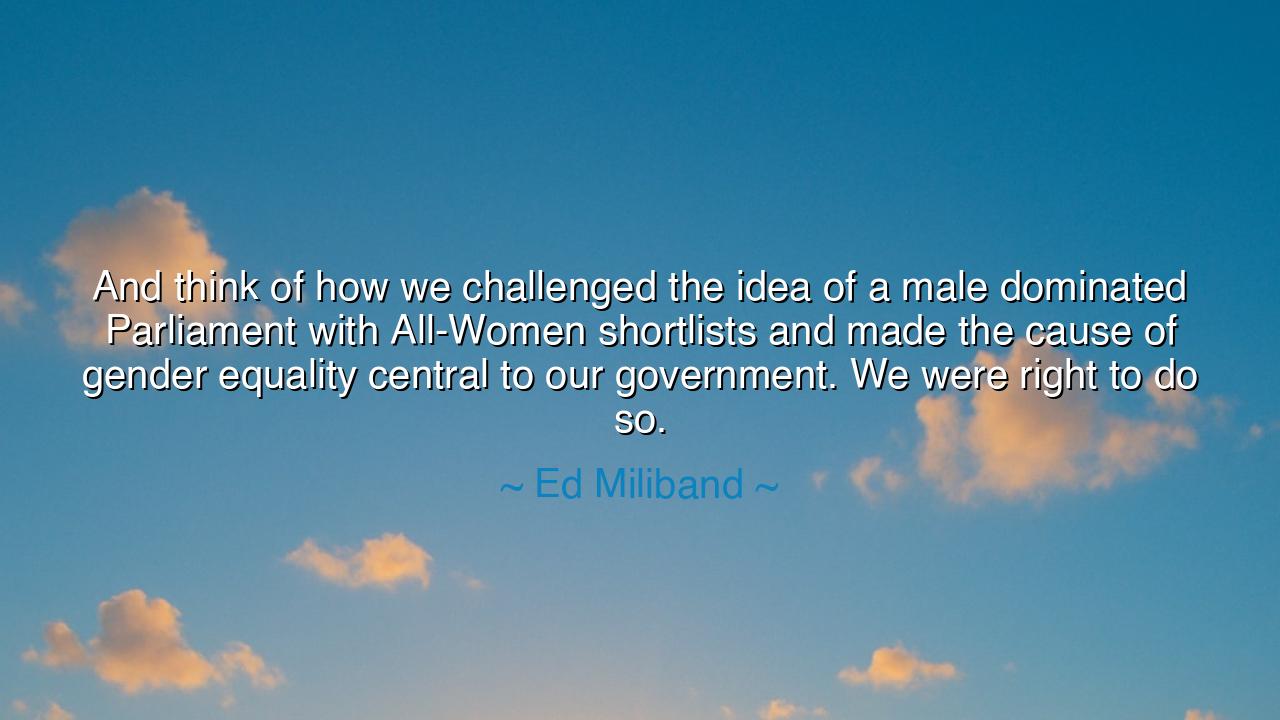
And think of how we challenged the idea of a male dominated
And think of how we challenged the idea of a male dominated Parliament with All-Women shortlists and made the cause of gender equality central to our government. We were right to do so.






When Ed Miliband declared, “And think of how we challenged the idea of a male dominated Parliament with All-Women shortlists and made the cause of gender equality central to our government. We were right to do so,” he spoke as one who had witnessed the weight of history and sought to break its chains. His words remind us that Parliament, long the fortress of men, could only become truly representative when the voices of women were not silenced at the gates, but welcomed within its halls. This was not merely a political maneuver—it was an act of justice, a rebalancing of power in a nation that claimed to stand for fairness.
The meaning of this quote lies in its boldness: to challenge the naturalized assumption that leadership must be male. For centuries, political power in Britain and across the world was a preserve of men, guarded by tradition and prejudice. By instituting All-Women shortlists, Miliband and his colleagues struck directly at the roots of exclusion, creating not a token gesture but a structural path by which women might stand, speak, and govern. In his words, the cause of gender equality was not an afterthought, not a decoration to politics, but the very heart of governance itself.
The origin of this effort is found in the struggles of the late 20th century, when women in Britain demanded not only the right to vote, but the right to be heard in the making of laws. Though the suffragettes had won the ballot a century earlier, representation lagged behind; the benches of Parliament remained overwhelmingly male. In the 1990s, the Labour Party introduced All-Women shortlists as a radical experiment to level the field. Their results were undeniable: in the 1997 general election, a wave of women entered Parliament, forever altering its face. Miliband’s words recall this turning point, affirming that the choice, controversial at the time, was both just and necessary.
History offers us earlier echoes of this battle. Consider the story of Olympe de Gouges, who during the French Revolution demanded a Declaration of the Rights of Woman and the Female Citizen. She exposed the hypocrisy of a revolution that proclaimed liberty and equality but excluded half its people. Though her voice was silenced by the guillotine, her spirit endured, whispering through the centuries into reforms such as those Miliband recalls. The struggle she began was the same: to break the illusion that power belongs only to men, and to affirm that women are equal heirs to liberty.
The wisdom of Miliband’s words is that equality does not appear by chance—it must be built by deliberate action. Left alone, entrenched systems do not yield. Privilege clings to itself, power defends its own image, and injustice hides behind the veil of “tradition.” It is only by bold reforms, like the shortlists, that the scales are rebalanced. Thus, to those who doubted, Miliband answers with conviction: “We were right to do so.” Justice is rarely convenient; it is often won by choices that seem disruptive, even dangerous. Yet such choices carve the path toward fairness.
The lesson is clear: equality cannot wait for permission. Those who long for justice must act, even if their actions provoke resistance. Just as All-Women shortlists broke the wall of a male-dominated Parliament, so too must each generation find the bold reforms that challenge the injustices of its time. Equality is not given—it is demanded, built, and secured by those with courage enough to seize it.
What then must the listener do? In your own circles, do not accept the silence of women or the dominance of men as “natural.” Question the traditions that exclude, and support reforms that open the way for fairness. Encourage women to lead, and ensure that leadership itself is not measured by male standards alone. Live so that your daughters, sisters, and friends need not fight the same battles, but can rise unimpeded into their rightful places of influence.
Remember always: a Parliament of men alone cannot govern all humanity. A society that excludes half its people cannot call itself whole. Miliband’s words stand as a reminder that the pursuit of gender equality is not only a women’s cause, but the cause of every just nation. Let this wisdom guide you—that when power is shared, when voices are many, when justice is central, then and only then can a people truly say: we were right to do so.






AAdministratorAdministrator
Welcome, honored guests. Please leave a comment, we will respond soon